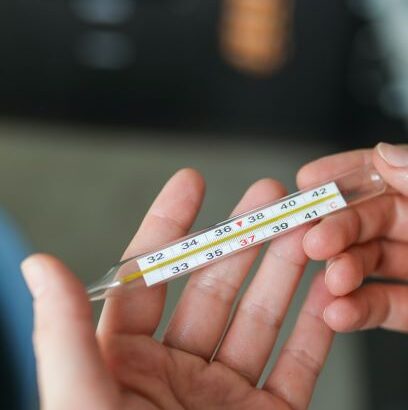What does your body signal when you have fever?

What is Fever?
Fever can be described as a rise in our body temperature which is more than normal. Everyone, whether young or old, can come under the grip of fever. So what becomes important is to be aware of certain conditions that leads to a rise in our body temperature and what can be its possible cure.
We all get easily worried when our body temperature rises but a mild rise in our body temperature might be an indication that our body is fighting off some attack of pathogens. But in case of severe fever, which can be a symptom of some serious condition, we should immediately seek medical attention.
How to monitor?

Fever, its causes and care
Being able to recognise fever helps us to monitor fever properly. A normal body temperature, which remains generally around 98.6°F or 37°C might fluctuate during the different times of the day or even it changes from person to person. Our body temperature normally remains lower in the morning but it can be little bit higher late in the afternoon or evening. Some other factors also might influence our body temperature.
Reasons for Fever
We experience a rise in our body temperature when a certain part of our brain called hypothalamus shifts the set point of our normal body temperature upward. Because of this we may experience shivering. Fever might accompany a number of some other symptoms also like sweating, headache, dehydration or weakness.
There might be different reasons that can be a cause of fever. Some possible causes are: infections in our body, immunization, some inflammatory diseases, food poisoning or some other internal bodily disturbance may shoot our body temperature.
What to do in case of fever?
In case of a mild rise in our body temperature, it is not something to be worried of. In fact, feeling a little feverish might be a good sign that our immune system is active and is trying to fight off some infection which has been caused by some pathogen.
In case of low fever, some home remedies can also help a lot. Ginger is very effective in such cases because of its antibacterial properties. So, it is very effective against fever, cough and other common symptoms. Also, one should drink a lot of fluids because it helps our body regulate temperature and drinking a lot of water might help us flush out unwanted germs. Even, taking plenty of rest and sleep can be a good option to help our body thwart any infection. Adequate rest and sleep give our body the required energy to fight off infection.
A low grade fever without any other symptoms may not require medical treatment. Drinking a lot of water and taking enough rest may help our body fight off fever effectively. But in case of high grade fever we should seek medical attention quickly. Also a doctor should be approached immediately if fever is accompanied by continuous vomiting, uneasiness, abdominal pain, breathing problem or some other disturbing symptoms.
What can be done to prevent fever?
As fever indicates that our body is preparing to fight off some infection which might be some attack of foreign particle, so limiting our exposure to those pathogens can be a good way to prevent fever. Also, wash your hands properly and don’t touch your mouth in case you were out where you encountered a large number of people. You should not touch your mouth, and you should cover your mouth and nose when you cough or sneeze.
A 360-degree overview:
Fever is a defence mechanism of our body. When it is active, we experience fever. An increase in our body temperature triggers a number of internal processes for protecting against or killing some pathogens which might try to make us sick. So, in case of mild temperature, there is no need to suppress fever. A mild fever can go away without any medicine.
(The content of this article is for informational purpose only. It cannot be a substitute for advice from a medical practitioner. Read DISCLAIMER for more…)








